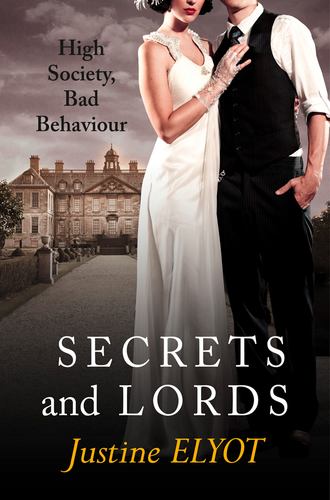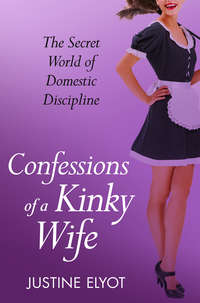
Полная версия
Secrets and Lords
‘Didn’t Mrs Munn say? A big dinner, some visitors from London. I don’t know who they are but I think they’re supposed to be important.’
Another surge of panic rose through Edie’s stomach.
‘Will I have to serve them?’
‘I shouldn’t think so, not your first day.’
She exhaled gratefully.
‘I wonder if Lady Mary will announce an engagement soon,’ Jenny prattled on. ‘They say she’s got ever so many admirers in London. But, like I said, she’s fussy.’
‘Neither of the sons are married?’
Jenny sighed. ‘No, and it don’t look likely neither. One’s a womaniser and the other’s a recluse. Come on, shall we go downstairs?’
The windows were bigger on the floor below and the fittings notably more elaborate.
‘Sir Charles’s rooms,’ whispered Jenny, her hand on an antique gold door handle.
‘Should we?’ Edie was suddenly nervous. ‘What if he’s in there?’
‘He went to town,’ she said. ‘With Lady Mary. Come on.’
‘There could be a woman in there.’
Jenny let out a peal of merry laughter. ‘You ain’t met him yet and you’ve got the measure of him already. Come on.’
She opened the door.
No woman was hidden behind it. The rooms were magnificent, crimson and gold, but the style was decidedly masculine and his valet had not yet cleared away his shaving things from the basin in the little bathroom. Edie felt possessed by a sense of the man who used these rooms; the scent of his cologne, mixed with a faint aroma of smoke, crept into her and took up residence in the corners of her consciousness. A dressing gown hung carelessly on a bedpost and his slippers were in the middle of the floor.
‘Who is his valet?’ Edie wondered aloud. ‘Should he not have tidied these things?’ She was proud of herself for remembering that aristocratic men all had valets. Although the social circles she moved in at home were mixed, they rarely involved lords and ladies.
‘He is between valets at the moment,’ said Jenny. ‘His last one resigned a few days ago. He is sharing with Sir Thomas until they can hire a replacement.’
‘Why did the last one resign?’
Jenny pinched her lips and shook her head.
‘I don’t know.’
But Edie thought that Jenny was concealing some further knowledge.
Moving towards the other side of the room, Edie saw a book on Sir Charles’s bedside table and was consumed with curiosity to know what kind of thing this man enjoyed reading.
‘Oh!’ she said, picking it up. ‘The Moon and Sixpence. I have read this.’
‘Put that down,’ exclaimed Jenny, rushing over. ‘Don’t touch a thing.’
‘We shouldn’t be in here, should we?’
‘No,’ she admitted. ‘Come on.’
She dragged Edie out by her elbow, but Edie was already wondering to what extent Sir Charles might identify with the book’s hero, his namesake, a man who abandons his established life to pursue an impossible dream.
‘His Lordship,’ she said, flapping her hand at another door without opening it, following up a moment later with ‘Her Ladyship’.
‘Oh, can we not go in?’
‘Her Ladyship is in. No, we cannot.’
‘I would so like to see her rooms.’
‘Well, you can’t. So there. Come on, let’s go to the ground floor. Like reading, do you?’
She opened a smaller door at the end of the corridor. It led on to a large gallery, looking down into a treasure trove of bookcases.
‘Oh, a library! Oh, this is huge. How wonderful.’
It occurred to Edie that perhaps she should not be displaying such raptures in her role as a housemaid. But surely housemaids might like to look at a book or two now and again?
‘Do a lot of reading, do you?’ asked Jenny, leading her down the steps to the main room. ‘You can’t have been very busy in your last place.’
‘Oh, I was, but I read on my days off, you know.’
‘Must have been nice for your family.’
‘They didn’t mind.’
Edie barely registered Jenny’s disparaging tone, too engrossed in the endless spines of gold-embossed leather that lay behind the glass doors of each cabinet.
‘At least they had the shelves turned into cupboards,’ said Jenny with a sniff. ‘I hated dusting all those perishing things. Lord Deverell thought we were going to ruin them just by touching them so he locks them away now.’
‘He is a keen scholar?’
‘No, not really. I suppose they’re worth a few bob, that’s all.’
Edie shook her head. The idea of valuing books for their monetary worth was quite beyond her. At home, in her room, her books lay in piles, higgledy-piggledy, with dog-eared pages and dusty jackets, but they were the landscape of her life, to be kept round about her, not shut away in cages.
She was reluctant to leave this wonderland, but they had to move on regardless, to a breakfast room in modern pinks and pale greens, then a comfortable sitting room and a brace of cold gilt state rooms, until they were at the central part of the house.
The splendour of these rooms left even Edie open-mouthed – as huge as the British Museum galleries and several times more ornate. She craned her neck up at pricelessly painted ceilings and then let her eye move downwards to works of Tudor and Stuart art, interspersed with gold leaf twining all over everything. The impression was sometimes sumptuous, sometimes intimidating. It was nothing like a home. How did people conduct their daily business in rooms like these? Reception rooms opened on to more reception rooms; then there were morning, drawing, breakfast and dining rooms, each with a different colour scheme and each groaning with antiques that would need careful dusting and cleaning, over and over again.
Seeing everything with a maid’s eye, Edie came to resent all the magnificence, much as her artistic senses were impressed. But really, who needed all this?
Out of the wings, Edie and Jenny now ran across several of their colleagues, all working hard to get the grandest rooms of the house into a fit condition to receive guests. Flowers were being arranged, feather dusters wielded and, in the dining room, a French polisher attended to a scratch on the table.
‘They’ll cover it with a cloth,’ whispered Jenny, whisking Edie past. ‘But Tilly Gresham got in terrible trouble for it all the same.’
A tall, thin, fastidious-looking man in a dark suit and white gloves appeared to be directing the carrying up- and down-stairs of a number of ornamental urns.
‘Jenny,’ he said. ‘Is this the new girl?’
‘Yes, Mr Stanhope, Edie Prior.’
‘Pleased to meet you, Miss Prior.’
‘Likewise,’ said Edie, unsure whether or not to curtsey. She decided against it.
‘Well, I’m sure you have work to do,’ said Stanhope after an awkward pause. ‘On such a day as this. And if not, I’ll be asking Mrs Munn why not.’
‘Don’t mind him,’ muttered Jenny, leading them to the back stairs. ‘He gets himself a bit worked up when there’s a big do. He’s the butler, if you didn’t know.’
They descended to the depths of the house once more, where Jenny collected a trug of cleaning materials before showing Edie to the room where Mrs Munn had ordered them to work.
They passed along endless yards of corridor, under the baleful eyes of the Deverell ancestry, up and down the back stairs and through that busy, bustling series of reception rooms before arriving at the well-named Green Drawing Room.
It was very green, and very golden, and very velvety and very cold – in style rather than temperature. Everything in it was heavy and sharp-cornered. When Edie considered her family drawing room in Bloomsbury, with its cheerful patterns and fringed shawls all over the place, it could not have been more remote.
‘Do people come in here to relax?’ she asked, looking over a two-hundred-year-old spinet in the corner of the room.
‘People hardly come in here at all,’ said Jenny vaguely, sorting through rags and polishes. ‘It’s not much used. Here, I’ll wax the wooden furniture and you can polish the mirror there.’
Edie accepted a rag and a tub of metal polish and made a start on the heavy ormolu-framed square mirror that stood over an unused fireplace.
They worked silently and diligently until Edie was drawn to the window by the sound of a car drawing up in the drive. She would not have admitted it to herself, but she was hoping for a glimpse of Ted.
The car was not the one she had ridden in earlier, though. It was that same sleek, cream-coloured monster that had twice passed her on the road.
The rain had abated and its driver got out on to wet gravel, looking up at the house windows as he did so. Edie took a swift step back, her heart pounding. Why did she not want to be seen? Because this must be Charles, the rake of the Deverell’s, and she had no wish to draw his attention to her.
He was pristine in a pinstriped blazer over light-coloured waistcoat, shirt and trousers. His dark hair was immaculately cut and he was clean-shaven. He didn’t wear a hat, and Edie approved of this, for she had no taste for the current fashion for straw boaters on men.
His eye was soon drawn away from the house, and he went to the passenger side to open it for a young woman.
‘Who is that?’ asked Edie, and Jenny came to look over her shoulder.
‘Lady Mary. Oh, don’t look. Sir Charles will see you.’
‘She is fearfully lovely.’
‘Yes. Come away.’
But a creeping fascination had overcome Edie, who noted that Mary was exceptionally fashionable and glamorous in a calf-length beige skirt, a lace-collared blouse and a loose belted jacket. Her hat was low on her brow over dark, shiny bobbed hair and she wore three long strands of pearls.
Jenny tried to tug her away but to no avail. Edie watched Charles take Mary’s arm to help her up the steps, then – disaster! He looked directly at her window. Her throat tightened and she tried to move away but she felt held there by the keen penetration of his gaze. It only lasted a moment, before Lady Mary slapped him on the elbow, as if in reproof, and he turned back to her, laughing.
But a moment was enough. Edie had been noticed, and now she felt like a marked woman.
Chapter Two
Her stomach in knots, she returned reluctantly to her mirror. The surround was devilishly full of sharp points and curlicues and polishing it was a more arduous task than she had imagined.
‘Lady Mary, the spoiled beauty. Shouldn’t she be in London for the season?’ she asked, resuming her labours.
‘So many questions,’ said Jenny briskly, putting the polish back in the trug. ‘Oh, lor’. Oh, dear me, no.’
Edie looked around, putting her materials down on the mantelpiece as a stricken-faced Jenny drew nearer.
‘What is it?’
‘You don’t never use polish on the ormolu. Didn’t you know that? It damages it. You can only dust that down.’
‘Oh, I had no idea,’ said Edie, her hands flying to cover her mouth.
Josie McCullen had never mentioned ormolu. Only silver and plain brass. Oh, there were so many gaps in her domestic education. She would be making huge mistakes all the livelong day.
Jenny sighed. ‘It’s probably all right,’ she said. ‘But that polish strips the gilt away. The most you can do is dab it with meths and a soft cloth, and then only when you can see some corrosion. Let me look a bit closer. Oh. Oh, dear.’
A tiny scrap of one of the curlicues had dulled, a tarnished patch amidst the bright gilt.
‘We’ll have to tell Mrs Munn,’ Jenny decided. ‘She’ll know how to fix it.’
Mrs Munn did know how to fix it – or, at least, she knew a restorer who did – but she still pursed her lips and tapped her fingers against the mantel in the servants’ dining hall when the maids made their confession.
‘It’ll have to come out of your wages,’ she told Edie. ‘I can’t imagine how you could be so careless. What kind of place have you come from, where they had no ormolu in the house?’
‘I’m sorry,’ repeated Edie, feeling like a spot of grease on the floor at Mrs Munn’s feet. ‘I only had charge of the silver and brass at Mrs Winchester’s.’
‘Perhaps we should keep you to the corridors and anterooms,’ mused the housekeeper. ‘But if I can’t use you where I see fit, then what’s the good of having you?’
‘Please, I promise to do better,’ pleaded Edie, close to tears.
‘Come on, have a heart, it’s her first day.’
The male voice from the doorway belonged to Ted Kempe.
‘I’ll thank you to keep your opinions to yourself, Kempe,’ snapped Mrs Munn. ‘This matter does not relate to motor cars, or any other area to which you can be expected to contribute.’
Ted shrugged. ‘We’ve all made mistakes, the first few days of a new place. Haven’t you, Mrs Munn?’
‘Yes, and I was properly corrected,’ she hissed, clearly unappreciative of the chauffeur’s attempts to pour oil on the troubled waters. ‘And thankful for it. You may go, Edie, and I will expect a substantial improvement on this performance tomorrow.’
‘Thank you, Mrs Munn,’ whispered Edie, and she ran from the servants’ hall, regardless of the fact that it was almost dinnertime, and into the darkening kitchen garden where she sat herself down on a low wall and burst into tears.
This was all a crazy, ridiculous mistake.
She would pack her bags, go back to London, back to papa and back to her circle of friends. Service was perfectly horrid and so was Deverell Hall and so was everything.
Except Ted Kempe. He was not horrid. He was kind and handsome, and he approached her now from the scullery door, uniform cap in hand, smile of rueful sympathy on face.
‘Hey, you’ll be missing your supper,’ he hailed her, coming closer and perching at her side. ‘That won’t do.’
‘Oh, please, leave me be. I’m not fit for company and I can’t bear to go in there and have all those eyes on me, knowing what a useless creature I am.’
‘Don’t be daft. They don’t think that at all. Here. Dry your eyes. I’m sure you don’t need to blow your nose, a ladylike person such as yourself but …’
He handed her a handkerchief and she giggled woefully.
‘Actually, I do,’ she said. ‘But I won’t, not in front of a gentleman.’
‘First time I’ve been called that,’ he said, beaming brightly. ‘I’ll treasure it.’
‘Well, you are, you know. Thank you for standing up for me in there. You didn’t need to do it.’
‘Mrs Munn needs reining in a bit sometimes, that’s all. She breathes fire on everyone and everything, not realising that, half the time, it just ain’t needed. You don’t need the same amount of flames for a paper tissue as you do for a bloomin’ oak tree.’
Edie laughed again. ‘Am I a paper tissue then?’
‘More like a paper rose,’ he said gallantly.
‘Oh, give over,’ she said, rather proud of herself for replicating one of Josie McCullen’s favourite expressions.
‘So, are you coming in? Get yourself some food, it’ll cheer you up. Steak and kidney pudding tonight, one of Fingall’s specials.’
Edie tried a few moments more of token resistance but ultimately she could not resist Ted’s blend of charm and solicitude. She followed him back into the house just as the first spots of new rain fell on already sodden ground.
* * *
‘I have my reservations about this.’ Mrs Munn hardly needed to voice the words; her face said them for her. ‘But Carrie really isn’t well enough to serve at table tonight. I don’t have anybody else. I’m counting on you.’
‘Thank you, I won’t let you down,’ Edie assured her, though she hoped she wouldn’t be asked to swear on her life.
Dinner in the servants’ hall had been surprisingly heartening, most of the staff having secret sympathetic smiles for her for her misfortune in getting on Mrs Munn’s bad side so soon. Nobody asked any awkward questions and only a couple of the girls looked askance at her when she came out with an overly London turn of phrase.
She had been sent on an errand after tea, a kind of test of her knowledge of the house’s geography. Unfortunately she had failed.
The first footman, Giles, had found her wandering about in the East Wing, wringing her hands as she passed the same door for a third time.
‘Hey,’ he said, appearing from behind a door – one of the family bedrooms, if she wasn’t mistaken. ‘What are you doing here?’
‘I don’t know where I am,’ she said helplessly. ‘I’m sorry.’
‘Let me show you back to the basement. Too many stairs in this place, that’s the problem. Don’t worry. I was the same when I started here.’
‘How long have you been here?’ she asked, following him along yards and yards of crimson carpet patterned with gold fleurs-de-lys.
‘Couple of years,’ he said vaguely. ‘Straight after I demobbed.’
‘Gosh, were you in the trenches?’
‘Yes.’
‘It’s a bit different to that here.’
He turned around and gave her a very odd smile.
‘Yes. In some ways,’ he said.
No more was spoken until they reached the kitchen.
But now Edie was in best black-and-whites, listening to Mrs Munn’s pep talk on how to behave when serving dinner guests.
She felt like breaking in and telling the woman that she’d been to enough dinners to know what was done and not done, but she had to endure the sermon without interruption.
In the background, Ted was eating a chicken leg and grinning at her.
It was too bad of him – Edie was flustered enough already and when he winked at her she had to look away and block him from her mind.
She was already a little feverish at the prospect of being in the same room as Sir Charles again. What was this peculiar fascination he held for her? She had never been drawn to such characters before. The thought that Jenny might be accurate in her surmise that he would notice her and try to seduce her made her feel alternately hot and cold all over.
By the time Mrs Munn’s talk was through, Edie felt an uncomfortable band of sweat beneath the elastic of her cap. All she could think of was the way he had looked up at her from the forecourt below, a blend of curiosity and something else, something she had never thought much about because it frightened her.
The trap. The thing that caught so many good women and took them out of the world, where they could have forged a path of their own.
She thought about this all the time she helped to lay the table, placing forks within forks and spoons below spoons. Jenny showed her how to fold the napkins ‘the Deverell way’ but she was clumsy and could not manage to pleat them properly, so she was sent to set out the glasses instead.
Cars had been pulling up outside the house all evening. Ted Kempe had made several journeys to and from the station as well.
She could hear the muffled voices from the reception room beyond and she tried to make out what people might be saying, but it was too hard. Now and again she heard the fruity, theatrical tones of Lady Deverell, followed always by laughter. This made her knees weaken. Sir Charles’s voice was distinctive too, but he didn’t seem to amuse quite as much.
Stanhope, the butler, sailed into the room just as the last piece of crystal was set in place.
‘Take your positions,’ he muttered.
Like frilled centurions, Edie and Jenny stood guard by the table, with four other servants, while Stanhope threw wide the large double doors on the far side of the room to announce dinner.
There were twenty-four at table and Edie found a vicarious interest in looking at the gowns and jewels as they shimmered past, adorning pale aristocratic flesh.
She did not know the woman on Sir Charles Deverell’s arm, but she saw him cast the quickest little dart of a glance in Edie’s direction before pulling out his companion’s chair.
Lady Mary was gorgeous in royal-blue satin overlaid with net, beaded and jewelled at the neckline and on the sleeves. She was transparently a female version of her brother, his dark looks softened and made sleek on her smaller canvas.
The man who limped in behind her must be the other brother, Sir Thomas. He had a thin moustache that did not look as if it had much more growth in it and his eyes were tired and hooded.
And then – yes, it could only be Lady Deverell, in sweeping floor-length emerald silk that swished about her and was overlaid with a cloud of black tulle. The emeralds at her throat and in her tiara set off the deep red of her hair, while swirls of black beads decorated her bodice and the hem of her skirts. She was like a creature from another world, and yet she was so familiar that Edie’s throat tightened and ached.
Lord Deverell, at her side, was a grizzled, faded nobody.
Edie felt a blush of transferred shame, as if all the gossip that must inevitably be attached to their marriage had infected her. But she was nothing to do with it.
The guests were mainly elderly, it seemed, with a sprinkling of younger people, perhaps their children. Everybody was talking about the grouse and salmon seasons, so perhaps they were fellow landowners from the local area.
She could not take her eyes off Lady Deverell, who smiled as brightly as the electric lamps at the theatre, dazzling the candlelight into a dim second place. But her smile was strange, not quite natural. At times it almost looked as if it wavered at the edges of her lips and then it found renewed purpose and flashed again in its full glory. Her eyes wandered, frequently settling on Sir Charles, who seemed to know a lot about their baffling topic of conversation and held the floor with effortless authority. She leant towards him when he cut across or contradicted his father and gave him an extra gleam of her teeth. She was amazingly beautiful.
Lady Deverell looked towards her, sharply, as if she had noticed Edie’s unbroken gaze. Edie dropped her eyes and looked instead at Jenny, who signalled that they were to serve the soup which had been brought up from the kitchen.
When she reached the table, Lady Deverell was still looking at her, but not hostilely now. She had a distant, dreamy kind of look upon her face, but it disappeared when somebody asked her about her jewels, whisking her back into the social slipstream.
Edie had been consigned to the end of the table, serving six of the elderly guests, but even at this distance Lady Deverell’s radiance reached out to her. Her hand shook and she could barely breathe.
‘Be careful, girl,’ snapped a dowager in pink and black lace.
A splash of soup had escaped the ladle and spotted the cloth.
‘Oh, I am so sorry,’ blurted Edie, desperate not to draw attention to herself.
The tiny contretemps had reached the notice of Sir Charles, however, for Edie became hotly conscious of his eye upon her. If only he would look away.
She avoided his gaze as studiously as she could, attending to her other guests, but when she glanced back up, he still watched her.
Her grip on the ladle slipped and it fell with a clatter back into the tureen.
Lord Deverell frowned and several ladies tutted, their jewels flashing as they turned to grimace at each other.
Edie apologised again, on the verge of tears. This was all a terrible mistake. She would catch the mail train back to London and tell papa she was sorry, she had been wrong and he had been right, could she now take back her old life, please?
‘Leave her be.’
The voice was rich and commanding and it belonged to Sir Charles.
‘She is new, I think. Isn’t that so?’
Edie nodded, wanting to be anywhere but this place, with all these eyes upon her.
‘Yes, sir.’
‘Well, then. First-night nerves. You know all about them, don’t you, mama?’ The way he said this, with a sneer, to Lady Deverell made Edie gasp, and she was not alone.
‘Charles!’ Lord Deverell reproved his son.
‘Sorry, did I speak out of turn?’ He sat back, dabbing his napkin at his lips with an insolent air.
Lady Deverell was flushed but it only made her more beautiful. She levelled a combative stare at Sir Charles and shook her head.








